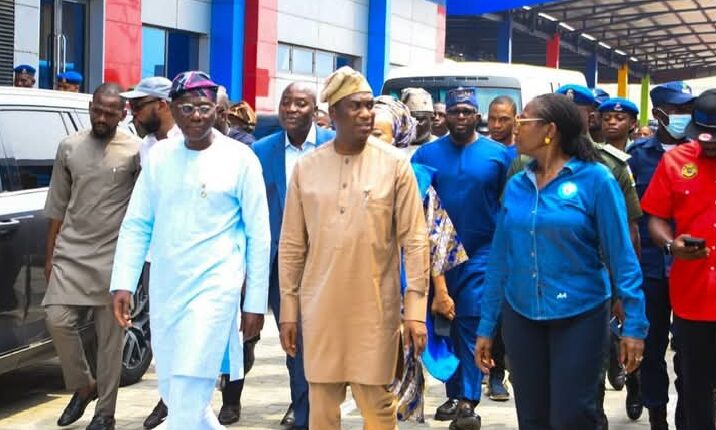Abule Egba suburb in Orile-Agege Local Council Development Area (LCDA) has been integrated into the growing network of Lagos communities connected by modernised public bus stations.
Governor Babajide Sanwo-Olu, on Tuesday, commissioned the newly completed Abule Egba Bus Terminal to aid and enhance seamless mass transportation from the suburb to other parts of the metropolis.
The imposing transport infrastructure, which is strategically situated close to Lagos Red Line corridor, provides a convenient transport route for passengers to board, exit buses and connect to other forms of transportation.
Sanwo-Olu said the project was another milestone recorded in his administration’s ongoing efforts to upgrade the State’s public transportation system with modern and sustainable infrastructure in order to enable the facilities meet up Lagosians’ commuting aspirations.
The Governor said the new bus terminal reflected his commitment to continuously enhance public transportation systems, strengthening connectivity and improving the overall experience for commuters.
He said: “Six years ago, we made a pledge to the people of Lagos that we would upgrade the State’s public transportation system with modern, sustainable infrastructure to enable them meet up their daily aspirations. Today, we are here in Abule Egba within Orile-Agege LCDA to handover yet another modernised bus terminal to our residents in fulfillment of our promise.
“This is a public bus terminal that will aid seamless commuting from here to other parts of Lagos. This infrastructure reflects our commitment to continuously enhancing public transportation systems, strengthening connectivity, and improving the overall experience for commuters. We are dedicated to taking ongoing steps to advance and modernise transportation across the State.”
Sanwo-Olu said his administration’s vision was not only to enhance mobility but also to catalyse urban and economic growth through interconnected transportation networks where residents would have choices to commute by rail, water or land.
He disclosed that his Government was building two additional interchange hubs in Marina and Mile 2, while another bus terminal is at the advanced stage of construction in Iyana Ipaja axis.
- Advertisement -
To further make intracity rail transport accessible to residents, Sanwo-Olu announced a 30 per cent reduction in fares for Lagos Red Line service, bringing down the fares from N1,500 to N1,000.
The Governor said the State was expecting the arrival of new Compressed Natural Gas (CNG) buses and electric buses by the third quarter of the year to enhance bus services.
The addition, he said, would expand the State’s current fleet, while also increasing the availability of buses and reducing waiting times at bus stops for commuters.
Urging residents in the area to take ownership of the project, Sanwo-Olu said: “This infrastructure has been made possible through your tax contributions. I urge you to take pride in it, protect it, and ensure that it remains safe from any harm or damage. By safeguarding these assets, we can all benefit from their long-term value and continue to build a better future for our community.”
Commissioner for Transportation, Mr. Oluwaseun Osiyemi, observed that the State’s strategic transportation policy emphasised provision of modern infrastructure to reduce travel time, while ensuring safety.
The Commissioner who was represented by the Permanent Secretary in the Ministry of Transportation, Mr. Wale Musa, said the State’s transportation policy was built upon a foundation of inclusivity, sustainability, and innovation.
“This policy embodies the government’s commitment to providing safe, reliable, and affordable transportation options for all residents, regardless of their socio-economic status or location within the state as well as the integration of our various modes of transport system,” the Commissioner said.
Managing Director of Lagos Metropolitan Area Transportation Authority (LAMATA), Mrs. Abimbola Akinajo, noted that sustainable infrastructure remained the backbone that would make seamless connectivity possible in a transport system.
She said: “Bus terminals are important because they offer central location for passengers to board and connect to other forms of transportation. To date, the Lagos Government has provided bus terminals in Ikeja, Oshodi, Ajah, Oyingbo, Yaba, Ojota, Ifako Ijaiye and now at Abule Egba. Iyana Ipaja bus terminal will soon join the list.”
Notable features in the Abule Egba terminal include loading bays, a terminal building with a customer service area, a waiting area, spaces for restaurants and other commercial services, offices for ground staff, public conveniences, a water treatment plant and provision for green energy, among others.




Comments are closed.